仁爱英语七年级下册unitoi教材讲解
仁爱版英语七年级下册 Unit6_Topic2_教材知识详解

Topic2 教材知识详解1. Wang Wei, what kind of home do you live in?王伟,你住在什么样的房子里?live in…意为“住在……”,句中的in不能省略,与前面的名词home构成动宾关系,但如果前面疑问词为副词时,可省去介词。
如:Where does Li Ming live?李明住在哪儿?(where是副词)Which city do you want to live in, Beijing or Nanjing?你想住在哪个城市,北京还是南京?(which city是名词,与live in构成动宾关系)类似的结构还有:Who do you want to go with?你想和谁一起去?2. Do you live with your grandparents? 你是与你祖父母住在一起吗?live with sb.意为“与某人住在一起”,其中with表示“和;与;跟;同”。
若表示“住在某地”要用短语live in。
如:They live in a farmhouse in the country. 他们住在农村的一所农舍。
3. Michael is looking for an apartment near our school.迈克正在找一套在我们学校附近的房间。
look for 意思是“寻找”,强调“找”的动作,后面直接跟名词。
如:I am looking for my missing gloves. 我正在找我的丢失的手套。
find强调“找”的结果,表示“找到”,后面直接跟名词。
find out意思是“找出,查明”,多指通过调查、询问之后找出、发现无形的、抽象的东西,强调目的。
如:I find my book in the desk. 我发现我的书在课桌里。
I’ll find out who has broken the window. 我要查明谁打碎了玻璃。
仁爱版英语七年级下册 Unit8_Topic1_教材知识详解
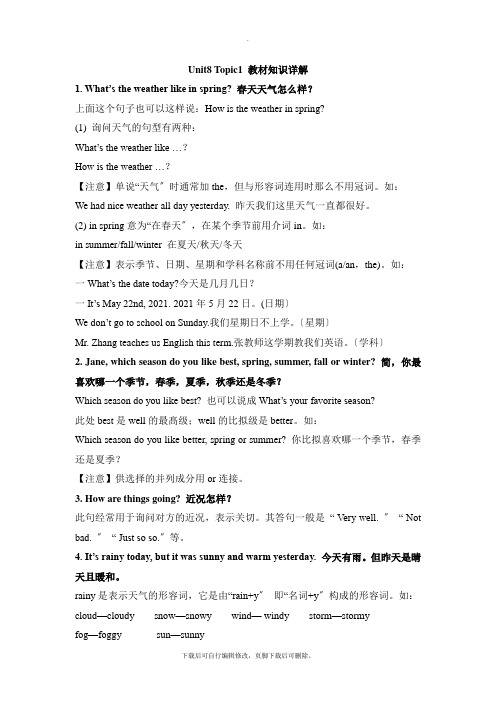
Unit8 Topic1 教材知识详解1. What’s the weather like in spring? 春天天气怎么样?上面这个句子也可以这样说:How is the weather in spring?(1) 询问天气的句型有两种:What’s the weather like …?How is the weather …?【注意】单说“天气〞时通常加the,但与形容词连用时那么不用冠词。
如:We had nice weather all day yesterday. 昨天我们这里天气一直都很好。
(2) in spring意为“在春天〞,在某个季节前用介词in。
如:in summer/fall/winter 在夏天/秋天/冬天【注意】表示季节、日期、星期和学科名称前不用任何冠词(a/an,the)。
如:一What’s the date today?今天是几月几日?一It’s May 22nd, 2021. 2021年5月22日。
(日期〕We don’t go to school on Sunday.我们星期日不上学。
〔星期〕Mr. Zhang teaches us English this term.张教师这学期教我们英语。
〔学科〕2. Jane, which season do you like best, spring, summer, fall or winter? 简,你最喜欢哪一个季节,春季,夏季,秋季还是冬季?Which season do you like best? 也可以说成What’s your favorite season?此处best是well的最髙级;well的比拟级是better。
如:Which season do you like better, spring or summer? 你比拟喜欢哪一个季节,春季还是夏季?【注意】供选择的并列成分用or连接。
(完整版)仁爱英语七年级下册unit5_topic3教材讲解

Unit 5 Our School LifeTopic 3 My school life is very interesting一. 重难点讲解1、What day is it today? 今天星期几?--It is Wednesday. 今天星期三。
What day……?用来询问星期几或是节日。
回答:It is……Eg: What day is it today? 今天是什么节日?It’s Children’s Day.今天是儿童节。
在星期几用介词on . Eg: on Wednesday. 周三2、What class are they having? 他们正在上什么课?--They are having a music class. 他们正在上音乐课。
= Which class are they having?(1)What class 用来询问“什么课程”= which class class=lessonEg: Morning classes/lessons begin at eight o’clock.Class: ①班级。
Eg: What class are you in? – I am in Class Seven.②一个班级的全体学生。
此时是一个集合名词。
Eg: Good morning, class!(2)have a music class/lesson. 上音乐课Eg:We are having an English class/lesson. 我们在上英语课。
3、What time is it over?几点下课?be over 结束(指状态)= end 结束;完成(强调动作)Eg:What time does it end? 几点结束?4、Working on math problems.解数学题work on 从事……;致力于……(根据多种语境可以有多种译法)Eg:He is working on a new novel. 他正在写一部小说。
仁爱版七年级英语下册Unit6topic1教材讲解.doc

Unit 6 Our Local AreaTopic 1 Is there a computer in your study?一.重难点讲解1、There is / are…(1)用法:There be "有",其确切含意为"某处或某时存在某人或某物。
"其结构是:There be + 某人或某物+ 表示地点或时间的状语。
There be 后面的名词实际上是主语,be 动词的形式要和主语在数上保持一致,be动词后面的名词是单数或不可数名词时用is,名词是复数时用are。
(2)几种基本句式:There is a book and two pens on the desk. 桌上有一本书和两支笔。
There are two pens and a book on the desk. 桌上有两支笔和一本书。
There isn’t a book on the desk. 桌上没有一本书。
There aren’t two pens on the desk. 桌上没有两支笔。
Is there a book on the desk? Yes, there is. No, there isn’t. 桌上有一本书吗?是的,有。
不,没有。
Are there two pens on the desk? Yes, there are. No, there aren’t. 桌上有两支笔吗?是的,有。
不,没有。
(3)与have的区别:2、It’s on the second floor.There is a study next to my bedroom.它在二楼。
我卧室的隔壁有一间书房。
(1)floor “地板;楼层”,常以介词on连用。
表示楼层时,英美之间是有区别的:英国美国一楼:the ground floor the first floor二楼:the first floor the second floor三楼:the second floor the third floor在表示几层楼的房间时,不用floor,而用story(美)或storey(英) Eg: a five-story/storey house 一栋五层的房间。
仁爱英语七级下册Unittopic知识点重点讲解

Unit5 Our school lifetopic1 How do you ususally come to school一.重点句型1.Happy New Year! The same to you.2.Your new bike looks very nice. Thank you.3.How do you usually come to school? —I usually come to school by subway.4.How often do you go to the library?5.—Once/Twice/Three times a week/Very often/Every day/Sedom6.The early bird catches the worm. (谚语) 笨鸟先飞7.Work / Study must come first. 工作/ 学习必须放在第一位!8.Classes begin at eight. =Class begins at eight.9.What time does the class begin? / What time do the classes begin?10.We have no more time. 我们没有更多的时间了。
11.I have four classes in the morning and two in the afternoon.我早上上四节课,下午上两节。
12.She goes to bed at about a quarter to ten. 她九点四十五分睡觉。
二.重点短语1.on foot go …on foot = walk ( to )…2.at the school gate在学校大门口3.on weekdays 在平日 ,在工作日4. on weekends=on the weekend在周末5.after school 放学后6.after class 下课后7.after breakfast / lunch / supper早餐/ 午餐/ 晚餐后8.in one’s free time在某人空闲时间9.have a rest 休息一下10.read books 读书11.go swimming 去游泳12.listen to music 听音乐13.watch TV 看电视14.do(one’s)homework 做作业15.go to the zoo / park 去动物园/ 公园16.once a week 一周一次17.every day 每天18.have classes 上课19.for a short time一会儿20.go to bed 上床睡觉e on 快点,加油,来吧22.get up 起床23.talk with / to sb.与某人谈话24.at school 在学校、在上课25.go to school 去上学26.and so on ……等等三.重点详解1.by+交通工具,表示使用某种交通方式,中间不加限定词,如果交通工具前有a, the, my 等限定词,就不能用by,而是用in或是on. by +动词ing形式,表示通过某种方式乘坐交通工具:by +交通工具(by car/bus/train/ship)t ake the+交通工具(take the bus/car)on+大型封闭式工具(on the bus/ train/ship/plane)on the train=by train on his bike=by bike on a bike/motorbikein +小型封闭交通工具(in a car/taxi)in my car=by carI always come to school by bus.(表交通工具)People show love to their mothers by giving cards.(表方式)You can be a good student by working hard.(表方式)He often go back home____________/_____________ (bus) (使用两种表达方式)Jane always comes to China____________/_____________ (plane) (使用两种表达方式)I don’t want to go there ____________/_____________ (bike) (使用两种表达方式)巧辩异同on foot 与walk on foot “走路”,是介词短语,不能作谓语,只作方式状语,位于句末。
仁爱版七年级下册Unit Topic 知识点归纳
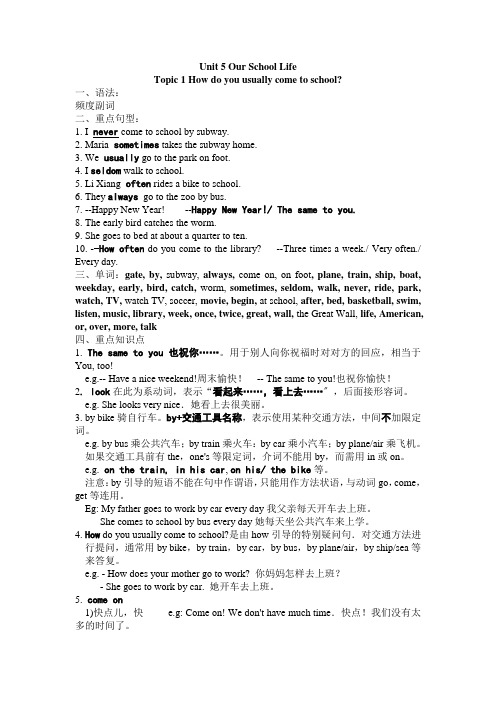
Unit 5 Our School LifeTopic 1 How do you usually come to school?一、语法:频度副词二、重点句型:1. I never come to school by subway.2. Maria sometimes takes the subway home.3. We usually go to the park on foot.4. I seldom walk to school.5. Li Xiang often rides a bike to school.6. They always go to the zoo by bus.7. --Happy New Year! --Happy New Year!/ The same to you.8. The early bird catches the worm.9. She goes to bed at about a quarter to ten.10. --How often do you come to the library? --Three times a week./ Very often./ Every day.三、单词:gate, by, subway,always, come on, on foot, plane, train, ship, boat, weekday, early, bird, catch, worm, sometimes, seldom, walk, never, ride, park, watch, TV, watch TV, soccer, movie, begin, at school, after, bed, basketball, swim, listen, music, library, week, once, twice, great, wall, the Great Wall, life, American, or, over, more, talk四、重点知识点1. The same to you也祝你……。
仁爱版七年级英语下册unit5_topic1教材讲解
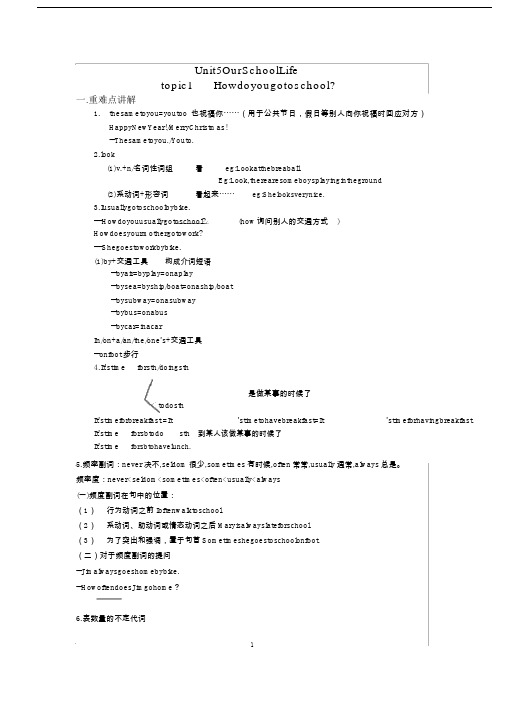
Unit5OurSchoolLifetopic1Howdoyougotoschool?一.重难点讲解1.thesametoyou=youtoo也祝福你⋯⋯(用于公共节日,假日等别人向你祝福时回应对方)HappyNewYear!/MerryChristmas!--Thesametoyou./Youto.2.look(1)v.+n/名词性词组看eg:Lookatthebreaball.Eg:Look,therearesomeboysplayingintheground(2)系动词+形容词看起来⋯⋯eg:Shelooksverynice.3.Iusuallygotoschoolbybike.---Howdoyouusuallygotoschool?(how询问别人的交通方式)Howdoesyourmothergotowork?---Shegoestoworkbybike.(1)by+交通工具构成介词短语--byair=byplay=onaplay--bysea=byship/boat=onaship/boat--bysubway=onasubway--bybus=onabus--bycar=inacarIn/on+a/an/the/one’s+交通工具--onfoot步行4.It’stime forsth/doingsth是做某事的时候了todosthIt’stimeforbreakfast.=It’stimetohavebreakfast=It’stimeforhavingbreakfast.It’stime forsbtodo sth到某人该做某事的时候了It’stime forsbtohavelunch.5.频率副词:never决不,seldom很少,sometimes有时候,often常常,usually通常,always总是。
频率度:never<seldom<sometimes<often<usually<always(一)频度副词在句中的位置:(1)行为动词之前Ioftenwalktoschool.(2)系动词、助动词或情态动词之后Maryisalwayslateforschool.(3)为了突出和强调,置于句首Sometimeshegoestoschoolonfoot.(二)对于频度副词的提问--Jimalwaysgoeshomebybike.--HowoftendoesJimgohome?6.表数量的不定代词1(1)few几乎没有,极少(表否定)(2)afew少数几个,一些(表肯定)代替或修饰可数名词,在句中作主语、宾语、定语Eg: Sheisnewhere,soshehasfewfriendshere.(几乎没有)Sheisnewhere,butshehasafewfriendshere(.有几个)(3)little不多,几乎没有(表否定)(4)alittle虽少,但是还有一些,一点儿代替或修饰不可数名词,在句中作主语、宾语、定语Eg:Hurryup,thereislittletimeleft.(没有时间)Thereisalittlewaterinthecup,youcandrinkit.(一些水)7.have+a+名词havealook看一看haveaswim游泳haveameeting开会eg:Dotheyhaveashortbreakafterlunch.8.inone’sfree/sparatime在某人闲暇时Ioftenplaycomputergamesinmyfree/sparatime.10.play+球类名词playfootball/basketballPlay+the+乐器playtheguitargo+doing表示去做某事gofishing/shopping/swimming/skating11.一般现在时:表经常反复的动作,存在的状态或习惯性动作。
仁爱版七年级下册Unittopic知识全解图文稿

仁爱版七年级下册U n i t t o p i c知识全解文件管理序列号:[K8UY-K9IO69-O6M243-OL889-F88688]Unit 6 Topic 2 My home is in an apartment building重点单词1、建筑名称:townhouse farmhouse apartment store bankbookstore parking lot supermarket2、道路名词:street railway station road traffic area3、地区名词:Country city countryside community4、动词:rent post close sleep miss move5、名词:month end sport service cost air6、形容词:quiet close colorful noisy freshSection AI 重点短语1 What kind of 什么种类2 A townhouse with two floors 一套两层的排房3.Live with 和…住在一起4.Live in 居住在…5.In the country在农村6.Like doing sth.7.Look for 寻找8.For rent 出租9.room wanted 求租房屋10. A quiet room. 一个安静的房间11. Call sb. At+电话号码打某人的电话。
II 重点知识点1.Wang Wei, what kind of homedo you live in?2.It’s a townhouse with two floors.1)Kind名词“种类,类型”what kind of…“哪种…What kind of sports do you like?2)拓展:a kind of一种 many kinds of许多种, all kinds of 各种各样的。
仁爱版七年级英语下册教材解说课件T
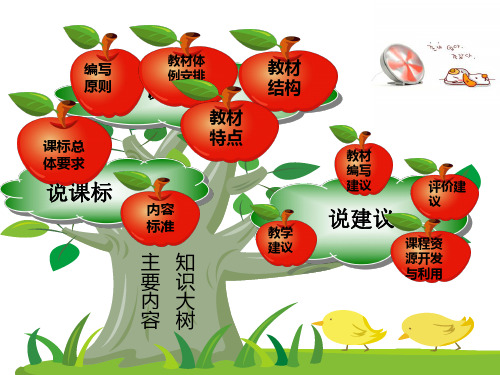
语音
语法 功能
文化 知识
资源
文化得体意运识用语言的保证
总
学习提高策学略习效率, 体 发展自主学习能力 目
的保证
标
交际 认知
调控
语言知识 话题
听 语言技能 综的合 基语础言运用能力说
读 写
一、说课标
2.内容目标
对英语学习表现出较强的 自信心,能在学习中相互 学习帮助,克服困难。
能意识到语言 交际中存在文 化差异
紧验紧 联地系与在学一生起的。年如龄七特年征级、下认 册知的教 单结四材 元构个、单设 都生元计 有活十了 语经二大 言量 活的 动第听 ,一说 且册读 内有写容词材不汇料同70。,0个每形左个式 个话题:怎样去学校、学校的生多活样、学,校学课生程对这些右活,动第充二满册兴约趣45,0个所,以
科时计一画目 间 划、日、幅面房期节副,间、假充令的能日类会。满你型、由情眼、生于趣睛房日这屋聚些,一的会都幽亮环 、 是默。境天学大 g、气生生它ro家指变熟u动不路化悉都p的仅问、的能w路假话o情r、期题k绪,,g高a昂m第 册 50地e三 约0s个参等册 40,加活约0个 合p动4a5,计。i0r 个2w学第5o,0生五r0k第们个册, 四充。约 生版活中面经设常计碰到充的满事新情,意所,以而学满生且了容在易自内接信受,,开心地这练一习点说正英好语达。到《英语
形成性评价
评
终结性评 价
价
目的:激发学生兴趣,调动学习
积极性,增强自信心,培养合作
建
意识,英语教学评价活动的主体
议
目的:是检测学生综合 运用语言能力的重要途 径,也是反映教学效果 重要指标
评价建议 :
形式: 课堂学习活动评比、学习效 果自评、学习档案、问卷调 查、访谈、测验等。
(完整word版)最新(仁爱版)七年级下册Unit6topic2知识全解
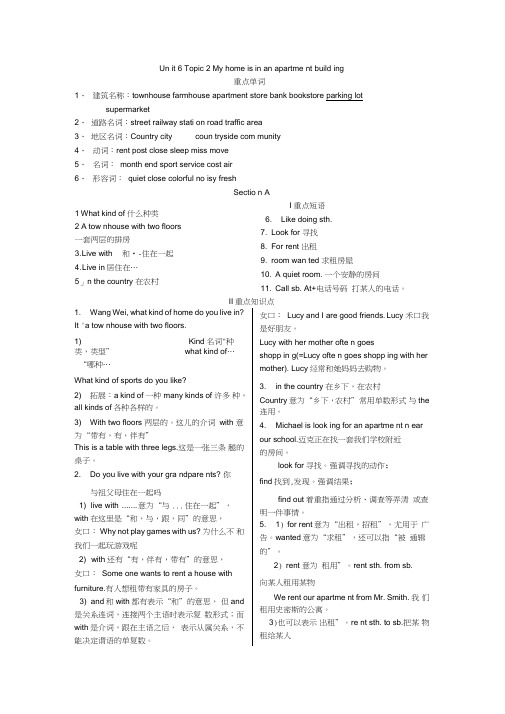
Un it 6 Topic 2 My home is in an apartme nt build ing重点单词1、建筑名称:townhouse farmhouse apartment store bank bookstore parking lotsupermarket2、道路名词:street railway stati on road traffic area3、地区名词:Country city coun tryside com munity4、动词:rent post close sleep miss move5、名词:month end sport service cost air6、形容词:quiet close colorful no isy freshSectio n AI重点短语6. Like doing sth.7. Look for 寻找8. For rent 出租9. room wan ted 求租房屋10. A quiet room. 一个安静的房间11. Call sb. At+电话号码打某人的电话。
II重点知识点1. Wang Wei, what kind of home do you live in? It 'a tow nhouse with two floors.1) Kind名词"种类,类型”what kind of…“哪种…What kind of sports do you like?2) 拓展:a kind of 一种many kinds of 许多种,all kinds of各种各样的。
3) With two floors 两层的。
这儿的介词with 意为“带有,有,伴有”This is a table with three legs.这是一张三条腿的桌子。
2. Do you live with your gra ndpare nts? 你与祖父母住在一起吗1) live with ....... 意为“与... 住在一起”,with在这里是“和,与,跟,同”的意思,女口:Why not play games with us? 为什么不和我们一起玩游戏呢2) with还有“有,伴有,带有”的意思,女口:Some one wants to rent a house with furniture.有人想租带有家具的房子。
仁爱版英语七年级下Unittopic知识清单图文稿

仁爱版英语七年级下U n i t t o p i c知识清单集团文件版本号:(M928-T898-M248-WU2669-I2896-DQ586-M1988)仁爱版英语七年级下U n i t6知识清单Topic 3一,重点句型及交际用语1, Excuse me, Is there a bank near here-----Go up Xinhua Street to the end,and you’ll find it on your left.2, Excuse me,How can I get to the library-----Go along Xinhua Street and turn right at the first crossing.3, Excuse me, could you tell me the way to Dinghao Buidling? 4, Excuse me, Where is Beitai Road-----It's about 15 kilometers away from here.5, How far is it from here?------It’s about ten kilometers away from here.6, Stop when the light is red.7, Don’t play on the street.二,语法聚焦(1) go up沿着(道路)走,up为介词,意为“沿着,顺着(某方向),朝上方向”(2) along 介词“沿着,顺着”walk along = go along = go up(3) you’ll find it on your left,为一般将来时,表示将要发生的动作或状态.一般将来时标语法结构为:“will+动词原形”“或be going to + 动词原形”.eg:Let’s boating up the river.Please walk up the street.We will go swimming tomorrow.----We are going to go swimming tomorrow.(4)turn right/left 向右/左转turn 做名词时可表示“顺序,机会。
(仁爱版)七年级下册Unit7Topic1知识全解-学习文档
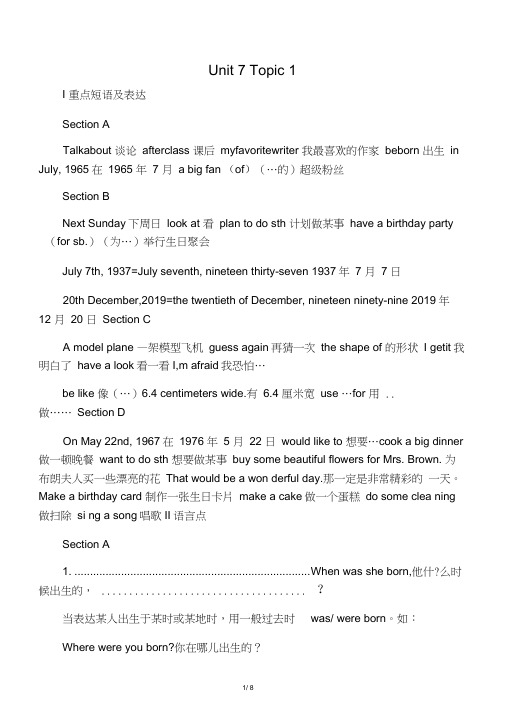
Unit 7 Topic 1I 重点短语及表达Section ATalkabout 谈论afterclass 课后myfavoritewriter 我最喜欢的作家beborn 出生in July, 1965在1965 年7 月a big fan (of)(…的)超级粉丝Section BNext Sunday下周日look at 看plan to do sth 计划做某事have a birthday party (for sb.)(为…)举行生日聚会July 7th, 1937=July seventh, nineteen thirty-seven 1937年7 月7 日20th December,2019=the twentieth of December, nineteen ninety-nine 2019年12 月20 日Section CA model plane —架模型飞机guess again再猜一次the shape of 的形状I getit我明白了have a look看一看I,m afraid我恐怕…be like 像(…)6.4 centimeters wide.有6.4 厘米宽use …for 用 ..做…… Section DOn May 22nd, 1967在1976 年5 月22 日would like to 想要…cook a big dinner 做一顿晚餐want to do sth 想要做某事buy some beautiful flowers for Mrs. Brown. 为布朗夫人买一些漂亮的花That would be a won derful day.那一定是非常精彩的一天。
Make a birthday card 制作一张生日卡片make a cake做一个蛋糕do some clea ning 做扫除si ng a song唱歌II语言点Section A1. ............................................................................ W hen was she born,他什?么时候出生的,..................................... ?当表达某人出生于某时或某地时,用一般过去时was/ were born。
仁爱版七年级下册Unittopic知识全解

仁爱版七年级下册U n i t t o p i c知识全解 TTA standardization office【TTA 5AB- TTAK 08- TTA 2C】U n i t6T o p i c2M y h o m e i s i n a n a p a r t m e n t b u i l d i n g重点单词1、建筑名称:townhouse farmhouse apartment store bank bookstore parking lotsupermarket2、道路名词:street railway station road traffic area3、地区名词:Country city countryside community4、动词:rent post close sleep miss move5、名词:month end sport service cost air6、形容词:quiet close colorful noisy freshSection AI 重点短语1 What kind of 什么种类2 A townhouse with two floors 一套两层的排房with 和…住在一起in 居住在…the country在农村doing sth.for 寻找rent 出租wanted 求租房屋10. A quiet room. 一个安静的房间11. Call sb. At+电话号码打某人的电话。
II 重点知识点1.Wang Wei, what kind of home doyou live in?2.It’s a townhouse with two floors.1)Kind名词“种类,类型”what kind of…“哪种…What kind of sports do you like? 2)拓展:a kind of一种 many kinds of 许多种, all kinds of 各种各样的。
仁爱英语七年级下册unittopic教材讲解

Unit 5 Our School LifeTopic 3 My school life is very interesting一. 重难点讲解1、What day is it today 今天星期几?--It is Wednesday. 今天星期三。
What day……用来询问星期几或是节日。
回答: It is……Eg: What day is it today 今天是什么节日?It’s Children’s Day.今天是儿童节。
在星期几用介词 on . Eg: on Wednesday. 周三2、What class are they having 他们正在上什么课?--They are having a music class. 他们正在上音乐课。
= Which class are they having (1)What class 用来询问“什么课程”= which class class=lessonEg: Morning classes/lessons begin at eight o’clock.Class: ①班级。
Eg: What class are you in – I am in Class Seven.②一个班级的全体学生。
此时是一个集合名词。
Eg: Good morning, class!(2)have a music class/lesson. 上音乐课Eg:We are having an English class/lesson. 我们在上英语课。
3、What time is it over几点下课?be over 结束(指状态)= end 结束;完成(强调动作)Eg:What time does it end 几点结束?4、Working on math problems.解数学题work on 从事……;致力于……(根据多种语境可以有多种译法)Eg:He is working on a new novel. 他正在写一部小说。
- 1、下载文档前请自行甄别文档内容的完整性,平台不提供额外的编辑、内容补充、找答案等附加服务。
- 2、"仅部分预览"的文档,不可在线预览部分如存在完整性等问题,可反馈申请退款(可完整预览的文档不适用该条件!)。
- 3、如文档侵犯您的权益,请联系客服反馈,我们会尽快为您处理(人工客服工作时间:9:00-18:30)。
Unit 5 Our School LifeTopic 3 My school life is very interesting一. 重难点讲解1、What day is it today? 今天星期几?--It is Wednesday. 今天星期三。
What day……?用来询问星期几或是节日。
回答: It is……Eg: What day is it today? 今天是什么节日?It’s Children’s Day.今天是儿童节。
在星期几用介词 on . Eg: on Wednesday. 周三2、What class are they having? 他们正在上什么课?--They are having a music class. 他们正在上音乐课。
= Which class are they having?(1)What class 用来询问“什么课程”= which class class=lessonEg: Morning classes/lessons begin at eight o’clock.Class: ①班级。
Eg: What class are you in? – I am in Class Seven.②一个班级的全体学生。
此时是一个集合名词。
Eg: Good morning, class!(2)have a music class/lesson. 上音乐课Eg:We are having an English class/lesson. 我们在上英语课。
3、What time is it over?几点下课?be over 结束(指状态)= end 结束;完成(强调动作)Eg:What time does it end? 几点结束?4、Working on math problems.解数学题work on 从事……;致力于……(根据多种语境可以有多种译法)Eg:He is working on a new novel. 他正在写一部小说。
My father works on a farm. 我爸爸在农场工作He is working on computers. 他正在用电脑。
He is outside and working on the car. .他在外边修汽车。
work out 算出;计算。
Eg: The little boy can work out the math problem all by him self.这个小男孩能自己算出这道数学题。
5、They are learing about the past in the class.他们在课堂上了解过去。
(1)learn about 了解We learn English ,but we don’t learn about English.我们学习英语但我们不了解英语。
(2)learn = study学习(但 learn 侧重于强调学习的成果“学会,学到“学习具体的事情要用learn, 如: learn English ;study 还有钻研,研究的意思,表示研究性的学习,强调学习的过程)Eg: They are studying history.learn to do sth 学做某事Eg:let’s learn to speak English.6、You must like English very much. 你一定非常喜欢英语。
must 表肯定的猜测。
“一定……”Eg: That book must be Jane’s, because her name is on it.那本书一定是简的,因为她的名字在上面。
can’t be “不可能……”表否定的猜测Eg: That bike over there can’t be Jane’s,Hers is new.那边的自行车不可能是简的。
她的是新的。
7、What do you think of it? 你认为它怎样?--Sometimes it’s difficult and boring , so I don’t like it very much.有时难学且乏味,所以我不太喜欢(1)What do you think of ……? 你认为……怎么样?(表示主人对某人或某物的看法)可用 how do you like……? 此句还有询问对某物的喜欢程度Eg: What do you think of the book? 你觉得这本书怎样? ---It is very intersting .非常有趣。
=How do you like the book?How do you like China? 你有多喜欢中国。
---Very much. 非常喜欢。
(2)very much = a lot “非常”表程度Eg: I like playing basketball very much.= I like playing basketball a lot.8、 What’s your favorite subject? 你最喜欢什么科目?=Which subject do you like best?what’s one’s favorite ……?=which …… do/does sb like best? 某人最喜欢什么?What’s your favorite sport?= Which sport do you like best?9、Why don’t you like it?你问什么不喜欢它?Why don’t you +动词原形?“你为什么不…….?”此句型还可以用来提出建议,= why not…..? “为何不……呢?”Eg: Why don’t you play soccer with us? = Why not play soccer with us?为何不跟我们一起去踢球呢?10、At school , my tearchers and classmates are very friendly to me.在学校,我的老师和同学对我很友好。
be friendly to sd. 对某人友好 friendly 在此为形容词“友好的,友善的” = kindEg: Everyone here is very friendly to us. 这里的每个人对我们都很友好。
= Everyone here is very kind to us.11、I study Chinese,English,politics,art,history,geography,biology and some other subjects.我学习语文,英语,政治,美术,历史,地理,生物和一些其他的课程。
(1)当指在学校学习各门功课时study=learnLearn ①通过练习或教师指导而记住或学会;I’m learning to skate. 我在学滑冰。
②向某人学习,从……中学习We should learn from each other.我们应该相互学习。
③教与学并提Men learn while they teach. 教学相长。
Study 指用功学,钻研,研究Eg:He always studies math. 他总是学习数学。
(2)other 形容词,“另外的,其他的”表示泛指,常与名词复数和不可数名词连用。
Eg:I see John with some other boys.我看见约翰和其他一些男孩在一起。
如果other 前有the,this,any,each,every,no,none以及形容词性物主代词时,后面只加单数名词。
Eg:I have no other place to go. 我没有地方可去。
①the other 表示两者中的另外一个,可单独使用也可接单数名词。
Eg: He has two pencils. One is short,the other is long.他有两只铅笔,一只是短的,另外一只是长的。
②others 是other的复数形式,意为‘别的人或物’,表示泛指。
如:If you work hard.you will catch up with others soon.如果你努力学习,你很快会赶上别人的。
12、Attention,please!Here is the news.请注意,这儿有消息告诉大家。
①Attention,please!是书面或口头通知的常用语,目的在于提醒别人注意。
②News意为“消息,新闻”是不可数名词。
Eg: a piece of news 一则新闻或消息。
What’s the latest news?有什么新消息吗?13、There is a soccer game between Class One and Class Two on the playgroundat 5:00 this afternoon. 今天下午五点,一班和二班将在操场上举行一场足球赛。
Between是介词,意为“在……之间”,一般指两者之间。
Between…and…是介词短语,意为“在……和……..之间。
Eg: The chair is between the bed and the desk.那张椅子在床铺好桌子之间。
(1)指三者或三者以上的人或物中每两者之间,仍用between.Eg: She takes some medicine between three meals every day.她每天在两餐之间吃药。
(2)当涉及边界时指两个以上国家之间Eg: Switzerland is between France,Italy,Austria and Germany.瑞士位于法国,意大利,奥地利及德国之间。
14、Do you want to see the stamps of the world? 你想看看世界邮票吗?World 名词,“世界”All over the world = around the world 全世界15、 speak English = say ……in English 用英语说……Eg: My sister can’t speak English. 我的妹妹不会讲英语。
My sister can’t say the pen in English. 我的妹妹不会用英语讲钢笔。
16、Thank you for your hard work!谢谢你的努力工作。
(1)thank you / thanks for sth/doing sth. 为某事或坐某事而感谢。
